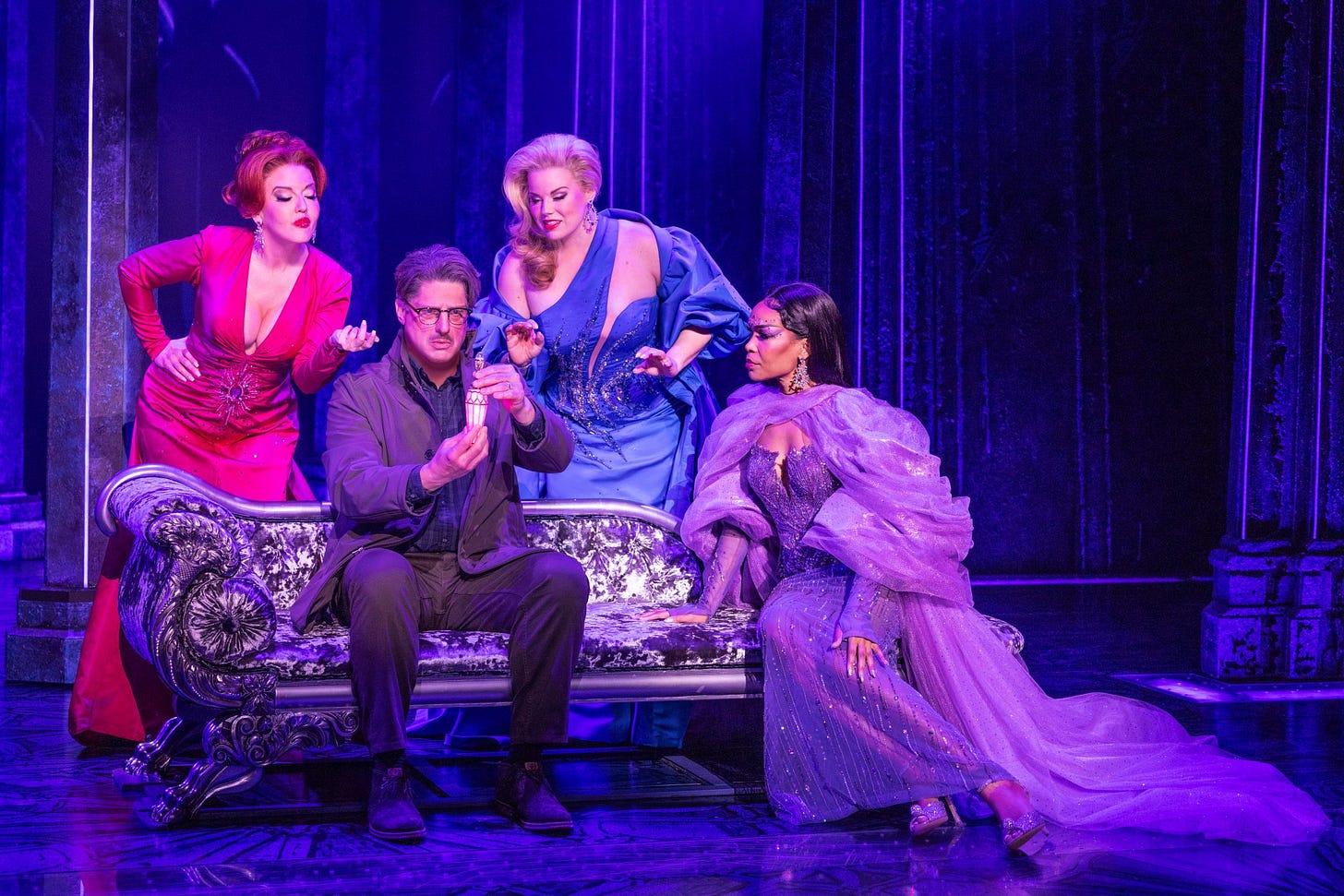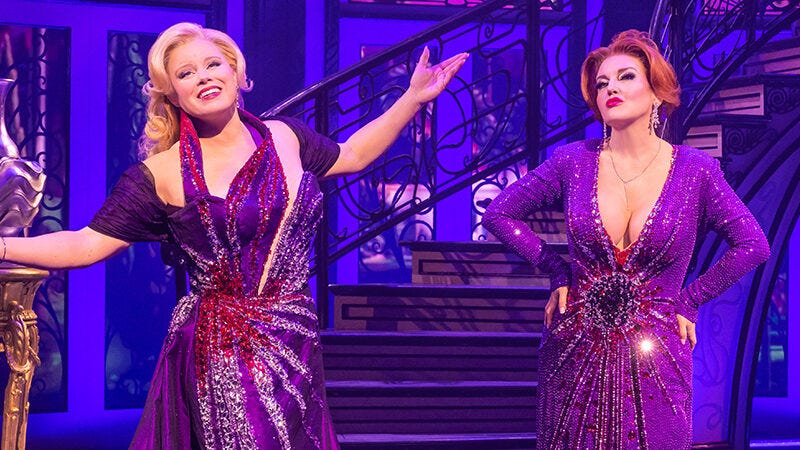Death Becomes No One
The Intelligent Showmosexual's Guide to Theatergoing and Ticket-buying With a Key to the Pictures
*Want to listen to this substack instead of read it? Scroll down for a link to audio!
One of cinema's most unforgettable pieces of scoring is the "Murder Theme" from Alfred Hitchcock's Psycho. Even if you've never seen the movie, you probably know it and have seen it quoted either in seriousness (as in Brian De Palma's Carrie) or as parody (as in this scene from The Simpsons). What you may not have noticed or stopped to consider is that it is, quite simply, the same three quarter-notes repeated multiple times. Although they are augmented by the addition of other dissonant pitches as the theme continues, the same pair of notes from the very first measure keeps playing and playing throughout its entirety in the exact same rhythm—notes that could, when grouped with other pitches and/or in different rhythms, make beautiful music. But the same high pitches, when repeated the same way in rapid succession, become jarring, abrasive, and maybe even borderline nauseating.
And that is the perfect metaphor for Death Becomes Her: incessant and aggressive hammering of the same notes turns something that had the potential to be enjoyable into something highly unpleasant.
A musicalization of Robert Zemeckis's cult classic film, Death Becomes Her ("DBH") revolves around the rivalry between longtime frenemies Madeline Ashton (Meryl Streep in the film/Megan Hilty on Broadway), a glamourous yet aging actress, and Helen Sharp (Goldie Hawn/Jennifer Simard), a dowdier writer who has always been in her shadow. Helen believes she finally has one up on Madeline because she's found the love of her life in Ernest Menville (Bruce Willis/Christopher Sieber)—until Madeline steals him away from her. Everything changes for this ill-fated trio when a mysterious beauty (Isabella Rossellini/Michelle Williams) offers them the chance to become immortal.

The musical very much panders to the large queer fan base the film has amassed, most literally in Madeline's introductory song, a show-within-a-show production number where she expresses her willingness to do anything "For the Gaze" while quick changing into looks made famous by queer icons. It seems like the aspirational template for the show, and especially this song, is the stage adaptation of Xanadu, another film that was elevated to cult status by LGBTQ+ audiences and was later adapted into an intentionally campy and self-referential stage musical. Sadly, that may be where the similarities end. Whereas Xanadu planted tongue firmly in cheek for a deliciously irreverent result, DBH is more like a wisdom tooth that grows in sideways and drills a hole in that cheek; initially, touching it can offer a rush of gruesome fun, but the inevitable end is numbness and then infection. Why does DBH fail where Xanadu succeeded?
One key reason is who wrote their respective books. Xanadu was adapted by Douglas Carter Beane, a prolific playwright whose works include As Bees in Honey Drown, The Country Club, Advice from a Caterpillar, and The Little Dog Laughed. He understands dramatic structure and theatergoing audiences. DBH was adapted by Marco Pennette, who's primarily a television writer and producer. Though his career has included an Emmy nomination for Ugly Betty and stints on popular (albeit uneven) shows like Desperate Housewives and Mom, his resume is dominated by single-season sitcoms—think The Golden Palace and Kirstie—and the kind of multi-season mediocrities that people watch but quickly forget, such as Caroline in the City and B Positive. The libretto for DBH sounds like one of those television shows: rapid-fire, familiar jokes that more often elicit smiles than laughter, but do occasionally squeeze out a guffaw. It even feels organized like a sitcom with a narrative reset every 21-23 minutes. When there are big laughs, they're almost always lifted directly from the film. So, if I can’t credit Pennette for writing good jokes, at least I can credit him for recognizing them.
However, just as in its plot, there are a lot of people to blame for the mess that unfurls during DBH. Two of the other most culpable are Julia Mattison and Noel Carey, who are jointly credited for its music and lyrics. They've written two highly effective songs, which open each act and are performed by Williams, and everything else…isn't exactly bad,[1] but also doesn't really add any value to the property, which left me wondering why the-proverbial-they even bothered to turn DBH into a musical? And, look, I know the answer is money, and continuing to ask such questions may be idiotic, but, to quote Ernest, "I'm going to be the kind of idiot I want to be."
The comedy-murderers' row does not stop there. Tony-winning choreographer Christopher Gattelli is here making his Broadway debut as a director, becoming the latest in a long line of examples who prove that expert skills in one domain don't necessarily transfer to the other. He is likely most responsible for all of the scenes being played at the same pitch and intensity, which is a shame because he knows to bring a variety of levels and vocabularies to his dances. But when performers who are as consistently funny as Hilty and especially Simard are grating and start to sound monotonous, the guiltiest party is usually the director.
I suppose that brings me to the cast.
Ugh.
Do I have to?
The ridiculously talented Hilty is the worst offender of playing things the same way all throughout the evening, often delivering lines with the exact same vocal cadence. Much of the score sits right in her break, and her incredibly rangy, versatile voice somehow sounds limited and underwhelming. Simard fares slightly better, but relies on so many of the same devices from her comic bag of tricks that we've seen put to better use in shows like Company, Hello, Dolly!, and Once Upon a One More Time, it makes her work—in DBH and all those other musicals—look less impressive. Sieber, whom I've often thought of as one of Broadway's best kept secrets, has a somewhat thankless role, forced to play the straight man (literally) in a world of over-the-top shenanigans, but understands and delivers what the role and production require, even successfully soliciting some titters in a tired "I'm drunk" song.
The buzz around Williams's performance has been pretty toxic. A friend in my book club (of entirely gay men…we're really cute) pretty accurately described it when he said, "It's as if someone told her, 'Do not—under ANY circumstances—try to act!'" That being said, she is in THRILLING voice and blows the roof off of the Lunt-Fontanne with her scintillating delivery of the musical's two good songs. As stilted as her acting is, Williams knows how to put over a number, and her performance of those songs marked the only times the show excited me in the way a musical should. So, don't forget, you heard it here first: Grammy-winning star of "Destiny's Child" Michelle Williams is a good singer.
Also. The sets look beautiful, the costumes look spectacular, and the special effects look…fine. (Yeah, maybe I should say more, but if the adaptors of DBH can give up, so can I.)
Even though the musical is meeting a moment that feels even riper for commentary on our obsession with youth and beauty than the era in which the movie was released, I didn't expect DBH to be particularly insightful or even incisive. I did, however, expect it to be fun. Despite some initial promise, it mostly ends up just being irritating. Therefore, in order to end on a semi-positive note, I'll say this: it was better than Redwood.
As Williams's character sings, "Don't say I didn't warn you."
[1] The one exception is the 11 o'clock number Mattison and Carey have written for Madeline and Helen, which is legitimately terrible—unmelodic, out of character, and so tonally wrongheaded, I'm gobsmacked it wasn't replaced in previews.
a guide to ticket-buying
I paid $63 with fees through my TDF membership and was seated in Orchestra U8. My view was totally adequate, but the Lunt-Fontanne's orchestra feels so cavernous, I'd recommend front mezz. over anything orchestra that's behind the overhang. At the same time, I would not recommend spending a penny more than a TDF price on this show.
a key to the pictures
Megan Hilty and the DBH ensemble perform "For the Gaze" on The Tonight Show Starring Jimmy Fallon
Jennifer Simard and Christopher Sieber perform "That Was Then, This Is Now" on Today With Jenna & Friends
Michelle Williams and the DBH ensemble perform "If You Want Perfection" at The Macy's Thanksgiving Day Parade with an introduction from Megan Hilty and Jennifer Simard
The original film is available for streaming rental or purchase on Amazon Prime, Fandango at Home, and Apple TV.



